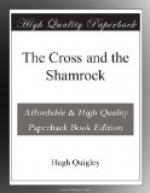The martyrology of the Irish church can attest the virtues of constancy and patriotism with which the O’Clerys bore their share of the wrongs of Erin and of her faithful sons. Whether or not the subjects of our narrative, the poor emigrant orphans, had any of this royal and noble blood flowing in their veins, is a thing that we cannot genealogically vouch. But that they were not degenerate sons of Erin, or faithless to their allegiance to the glorious old church of their fathers, we trust this history will amply demonstrate. At all events, the uncle of our hero, Paul O’Clery, held a very high station in the Irish hierarchy. Having, with eclat, finished his ecclesiastical and literary primary studies in the colleges of his native land, he subsequently repaired to Rome, where he won with distinction the title of “doctor in divinity and canon law,” and carried the first premium from many French, German, and even Italian competitors. Hence, soon after his return from abroad, on account of his learning, as well as his tried virtues, he was appointed the vicar general of the diocese of Kil——, a promotion which, far from exciting the envy, gained the unanimous approval, of the diocesan clergy. During the horrors of the general landlord persecution of the Irish Catholics, (for it is nothing else than a persecution of Catholics,) the O’Clerys found their name on the roll of the proscribed, and got notice to quit the homestead of their fathers. The principal cause for this proscription by the landlord was, that Dr. O’Clery, in the newspapers, exposed the system of cruel and barbarous extermination which took place on the extensive estates of Lord Mandemon—a gentleman who said he thought it far more honorable, as well as profitable, to have his princely estates in Munster tenanted by fat cattle than by Irish Papists. His lordship had also the mortification to learn that all the meat, money, and clothing he had employed for the last five years could not make one single sincere convert to his rich “law establishment.” When the “praties” were dear, and the crops failed, there were a few, to be sure, who would profess themselves ready to “ate the mate” on Friday; but as soon as plenty returned, the “new lights” went out, or returned to ask pardon of God, the priest, and the people; and Lord Mandemon and his soup were pitched to the “seventy-nine devils.” This failure, this result, so often before seen and felt, and so certain to follow, was,




